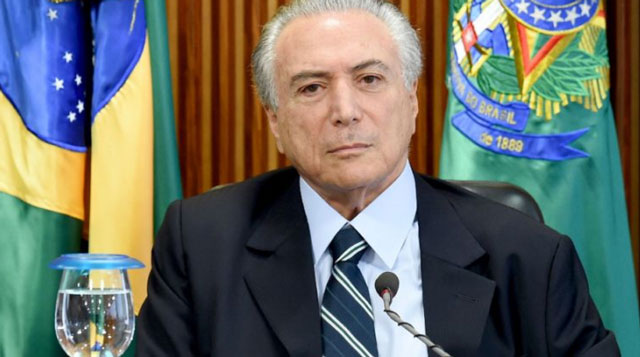
Rio de Janeiro, Brazil | AFP | Michel Temer is the first Brazilian president to face criminal charges while still in office. Yet here are four reasons why — for now — he may save his job.
– Scandals the new normal –
Temer is charged with receiving bribes from the world’s biggest meatpacking company JBS, which was already bribing hundreds of other politicians. The evidence includes footage of one of his closest aides running down a street with a suitcase stuffed with cash.
He’s also being investigated for obstruction of justice, where the main evidence is a secret recording of a late night conversation in which he allegedly can be heard blessing payments of hush money to a disgraced politician.
Now that Prosecutor General Rodrigo Janot has filed the bribery charge the case will wind its way to the lower house of Congress, where deputies must vote by a two thirds majority for a trial to start. Anything less and the charge is thrown out.
It might seem Temer cannot survive this kind of avalanche of bad news, but many analysts believe he will.
One reason is that corruption scandals have lost their shock value in a political system rife with them.
Of the 513 deputies who will have to vote on Temer’s possible trial, 185 are being investigated, many of them in the same “Operation Car Wash” probe that snared the president.
“This creates a web of solidarity,” says Sylvio Costa, founder of the specialist website Congresso em Foco.
The mentality goes something like this: if the president can be brought down, is anyone safe?
– No clear successor –
There’s no clear candidate to fill Temer’s shoes until the October 2018 elections if he is ousted.
The placeholder would presumably have to be acceptable to both left and right at a time of growing polarization and — just as trickily — not be under suspicion of corruption.
Things were different a year ago when leftist president Dilma Rousseff was impeached for breaking government accounting rules and forced from office. There was already a clear replacement: her center-right vice president Temer.
Lower house speaker Rodrigo Maia would automatically take over for 30 days — but just while a longer term replacement was being picked. Maia is a Temer ally and under investigation for bribery.
– Markets prefer Temer –
Temer may be deeply unpopular generally but he has fans in the business world, which supports his attempt to push through austerity reforms aimed at forcing fiscal discipline.
He has succeeded in several big measures, including a 20-year spending freeze and opening up the oil sector. Still to come is a controversial proposal to scale back the pension system and a loosening of labor laws.
“Part of the market wants Temer to continue because there’s more chance of reforms and there’s more chance that the economic team will stay on,” said MCM consultancy analyst Ricardo Ribeiro.
– Calm in the streets –
Huge demonstrations helped propel Rousseff from office. Although the protests were not decisive, they encouraged politicians pushing to remove her in the controversial impeachment trial.
Temer is widely loathed and his televised speeches regularly spark banging of kitchen pots and cries of “Temer out!” in big cities. There have also been several recent protests against his reforms this year that ended in violent clashes with police.
However, protesters are mostly from the left, while the middle class that opposed Rousseff is largely quiet.
In terms of sheer numbers the protests have also been muted, reaching the low tens of thousands at most, and never the hundreds of thousands that turned out against Rousseff.
 The Independent Uganda: You get the Truth we Pay the Price
The Independent Uganda: You get the Truth we Pay the Price



